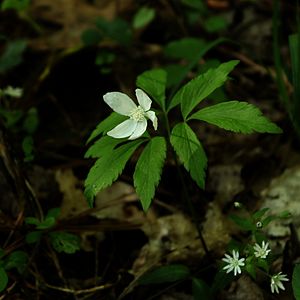Anemonoides lancifolia facts for kids
Quick facts for kids Anemonoides lancifolia |
|
|---|---|
 |
|
| At the Uwharrie National Forest in North Carolina | |
| Scientific classification | |
| Genus: |
Anemonoides
|
| Species: |
lancifolia
|
| Synonyms | |
|
|
Anemonoides lancifolia, often called the lanceleaf anemone or mountain thimbleweed, is a type of herbaceous plant. This means it has soft stems, not woody ones like trees. It is part of the Ranunculaceae family, which also includes buttercups.
Contents
Discovering the Lanceleaf Anemone
What Does the Lanceleaf Anemone Look Like?
These plants usually grow to be about 20 to 30 centimeters (8 to 12 inches) tall. They grow from a special underground stem called a rhizome. This rhizome grows sideways, helping the plant spread.
The lanceleaf anemone blooms from mid-spring to early summer. Its flowers have white sepals, which look like petals. These sepals are about 12 to 20 millimeters (0.5 to 0.8 inches) long.
This plant looks a lot like another species called Anemonoides quinquefolia. In fact, it was once thought to be a subspecies of it. The main difference is that the lanceleaf anemone grows larger.
After the flowers bloom, small fruits called achenes form in a cluster. Each achene is tiny, about 3.5 to 5 millimeters long. They do not have wings and have a small, straight or slightly curved beak. This beak is about 1 to 1.5 millimeters long.
Why Is It Called "Lanceleaf"?
Both the scientific name, lancifolia, and the common name, "lanceleaf," describe the plant's leaves. Its leaves are thinner than those of A. quinquefolia. They also have a unique, jagged edge, which is called serration.
Where Does the Lanceleaf Anemone Grow?
The lanceleaf anemone is native to the eastern parts of the United States. You can find it growing in North Carolina, South Carolina, Virginia, and West Virginia. It prefers to grow in rich, damp soils found in wooded areas.

